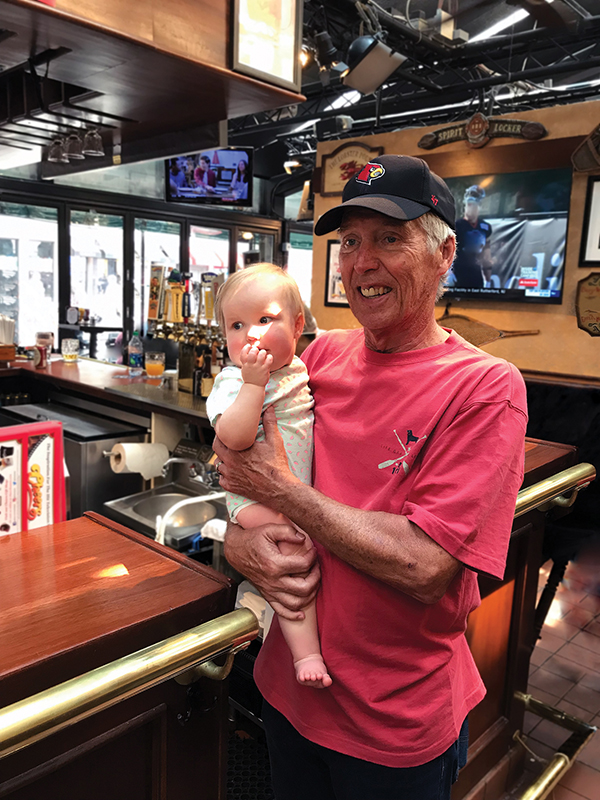Neuroendocrine Tumor Survivor

Focus on what you have — not what you don’t
Determined to find the best care for his rare neuroendocrine tumor (NET) diagnosis, Bob Burckardt surrounded himself with experts. As a result, he is able to live a full life with his wife, children and grandchildren.
I’m a medical professional and found myself-- for the first time ever as a patient -- going to the emergency room with abdominal pain. What I thought were gallstones showed up on the ultrasound as lesions on my liver. I was told it was metastatic cancer. I was admitted to the hospital, and a biopsy was taken. Results indicated pancreatic cancer.
The prognosis was grim. Without treatment, one oncologist thought I’d be gone in 90 days. Otherwise, maybe six months. I was just about to turn 64, happily married and working as an anesthesiologist in a dream job. One of my partners told me he’d seen Stage IV pancreatic cancer before, and this was not it. But, thinking I had no other choice, I began chemotherapy and retired early from anesthesiology.
After six cycles of the chemotherapy, I took a break. Because not every doctor can know everything about everything, especially an uncommon cancer, I sought a second opinion and information about clinical trials from a well-known cancer center. After a week, the pathologist there told me that although I did have cancer and it originated in my pancreas, it wasn’t pancreatic cancer – it was Stage IV NET – a neuroendocrine tumor.
I began to research and soon learned that treating NET took a whole different approach. I was started on a somatostatin analog, which was considered the standard treatment. The plan was to stay on it as long as I could until the disease progressed.
I found NET specialists at a university cancer center and another one nearby who became part of my health care team. I also met a German physician at a symposium who is a world-renowned expert in NETs. He talked with me about a treatment that was not yet available in the U.S.
The tumor had taken over a third of my liver, and the general consensus was that it could progress very rapidly. After several consultations with these specialists and another in New York, I traveled to Germany to have peptide receptor radionuclide therapy (PRRT), a type of radiation therapy that uses a radioactive drug that targets and kills the tumor cells. PRRT has since been approved in the U.S. and is now an available NET treatment. The PRRT was effective for me for three years before we saw progression.
The next treatment included a thoracotomy, liver embolization and oral chemotherapy. I enjoyed three more years without progression. Most recently I’ve begun a form of immunotherapy called a checkpoint inhibitor. Depending on how effective this therapy is, clinical trials may be on the horizon.
I’ve had the ongoing support of my family to help me. My wife and son encouraged me to – “made me” might be more correct – talk to other survivors, through email and in person at Gilda’s Club, a support group for people with all types of cancer. Even though I was reluctant at first, I find it very rewarding and I’ve made some great friendships. A fellow survivor introduced me to another organization called Friend for Life Cancer Support Network. As a peer mentor, I’ve been matched with others who have similar diagnoses. They live in Kentucky, Texas, North Carolina and as far away as Tel Aviv. We always have a lot to talk about, especially after one of us has passed a new hurdle.
My faith and my relationship with God have gotten better. I’ve certainly become more compassionate to other people who have cancer. I’ve also learned how important it is to look at the half full side of the glass. It keeps me from feeling too much self-pity.
Luckily, my diagnosis hasn’t changed my daily life too much, other than not working and having many doctor’s appointments. Although I’ve had progression over the years, I always find out about it from my follow-up scans. I can never tell the cancer has returned or spread by how I feel.
Fortunately, I’m still able to be very active. My wife and I enjoy taking hiking trips through the mountains in Utah and Wisconsin. My former oncologist once joked that I’m the poster child for NET. I also run with my dog daily, I hunt with my son and my dog, and our seven grandchildren keep me busy. Sometimes I get tired, but I’m not sure if I can blame that on the cancer, the treatment or just being 73!
Learning you have an incurable disease really makes you face your mortality. That’s what life is, after all. I advise you to choose to focus on what you have and be grateful for it. Remember that everyone’s experience is a little different. No one but God knows how long you’re going to live, so don’t give up.


